
In Western classical music, a motet is mainly a vocal musical composition, of highly diverse form and style, from high medieval music to the present. The motet was one of the pre-eminent polyphonic forms of Renaissance music. According to Margaret Bent, "a piece of music in several parts with words" is as precise a definition of the motet as will serve from the 13th to the late 16th century and beyond. The late 13th-century theorist Johannes de Grocheo believed that the motet was "not to be celebrated in the presence of common people, because they do not notice its subtlety, nor are they delighted in hearing it, but in the presence of the educated and of those who are seeking out subtleties in the arts".

Psalm 91 is the 91st psalm of the Book of Psalms, beginning in English in the King James Version: "He that dwelleth in the secret place of the most High shall abide under the shadow of the Almighty." In Latin, it is known as 'Qui habitat". As a psalm of protection, it is commonly invoked in times of hardship. Though no author is mentioned in the Hebrew text of this psalm, Jewish tradition ascribes it to Moses, with David compiling it in his Book of Psalms. The Septuagint translation attributes it to David.

Psalm 42, Op. 42 Wie der Hirsch schreit is a cantata by Felix Mendelssohn, setting Psalm 42 in German. It was written and published in 1837 for soloists, mixed choir and orchestra.
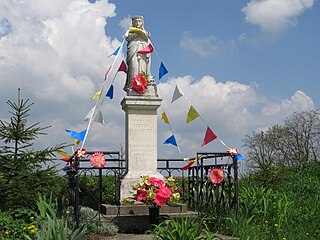
Psalm 115 is the 115th psalm of the Book of Psalms, beginning in English in the King James Version: "Not unto us, O LORD, not unto us, but unto thy name give glory". It is part of the Egyptian Hallel sequence in the fifth division of the Book of Psalms.

Tre Motetter, FS 139, Op. 55, is a composition for unaccompanied choir by Carl Nielsen. It is a setting of three quotations in Latin from different psalms chosen by the composer and his wife Anne Marie Carl-Nielsen. The three motets, Afflictus sum, Dominus regit me and Benedictus Dominus were first performed on 11 April 1930 at the Ny Carlsberg Glyptotek by Mogens Wöldike and the Palestrina choir, to whom they are dedicated. Among the composer's last works, they were published in 1931 by the Skandinavisk Musikforlag in Copenhagen.

Der Mensch lebt und bestehet, Op. 138, No. 1, is a sacred motet for unaccompanied mixed choir by Max Reger. The German text is a poem by Matthias Claudius, beginning with "Der Mensch lebt und bestehet nur eine kleine Zeit". The piece is in A minor and scored for eight voices in two choirs SATB. Composed in Meiningen in 1914, it was published in 1916 after Reger's death as the first of Acht geistliche Gesänge.
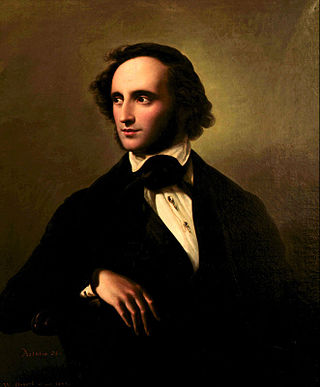
Jauchzet dem Herrn, alle Welt, WoO. 28, is an anthem for choir a cappella, a setting of Psalm 100 in German composed by Felix Mendelssohn in 1844. It was published in 1855 after the composer's death. It is the most popular setting of Psalm 100 by Mendelssohn, who also wrote a four-part motet in Latin, "Jubilate Deo", as part of Three Motets, Op. 69, in 1847 for use in the Church of England, which adds a doxology to the psalm text. He set the psalm again, but with paraphrased text by Ambrosius Lobwasser, "Ihr Völker auf der Erde all", as part of Sieben Psalmen, harmonising melodies from the Genevan Psalter.

Lord, have mercy upon us, WoO. 12, MWV B 27, is the incipit of a motet for choir a cappella in both English and German composed by Felix Mendelssohn in 1833. It is also known in English as Responses to the Commandments, and in German as Zum Abendsegen. It was published in 1842, both in English and German, and by Breitkopf & Härtel in 1875 in the complete edition of the composer's works.

Psalm 150 is a psalm setting by César Franck. He wrote the composition, setting Psalm 150 for four-part choir, orchestra and organ, in 1883. It was published in 1896 by Breitkopf & Härtel. Carus-Verlag published an arrangement for choir, strings and organ. The incipit in French is Halleluiah! Louez le Dieu, caché dans ses saints tabernacles.
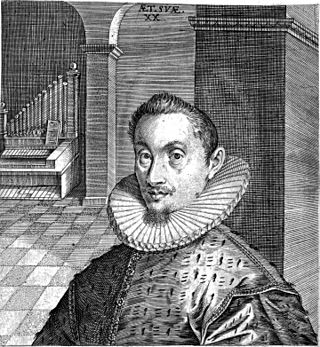
Dixit Maria is a motet for four voices by Hans Leo Hassler. It is part of his collection Cantiones sacrae published in 1591. It sets a verse from the narration of the annunciation in Latin. Hassler based a mass on the motet, Missa super Dixit Maria.
Hans-Günter Klein was a German musicologist, librarian, art historian, LGBT activist and researcher on the Mendelssohn family.
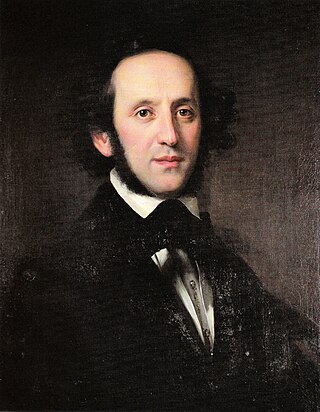
Sechs Lieder, Op. 59, is a collection of six part songs for four voices a cappella by Felix Mendelssohn. He composed the songs between 1837 and 1843, setting six poems in German. They are subtitled "Im Freien zu singen", and focus on nature. They were published after his death as part of his complete works. One of the songs, "O Täler weit, o Höhen" became so popular that it is also regarded as Volkslied.
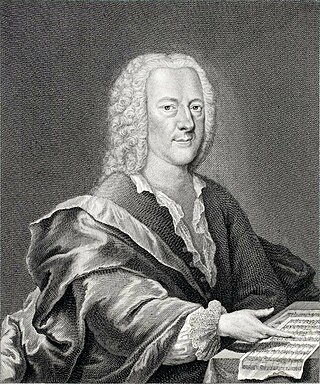
Georg Philipp Telemann composed the motet Ein feste Burg ist unser Gott, TWV 8:7, setting Luther's hymn in German, "Ein feste Burg ist unser Gott", for a four-part choir and continuo. The motet was first published around 1780. A modern edition was published by Carus-Verlag.

Drei Motetten, Op. 39, is a collection of three sacred motets for women's voices and organ by Felix Mendelssohn. Composed in 1830 for different liturgical occasions and in different scoring, they were published together in 1838.

Wer bis an das Ende beharrt, is a motet for a four-part choir by Felix Mendelssohn. He wrote it as part of his oratorio Elijah, published in 1847.

Die Deutsche Liturgie, MWV B 57, is a collection of musical settings of the ten sung elements in the Protestant liturgy, composed by Felix Mendelssohn for double choir a cappella. He wrote it in 1846 for the Berlin Cathedral, on a request by the emperor, Friedrich Wilhelm IV of Prussia. It was published by Breitkopf & Härtel in 1875 in the complete edition of the composer's works.

Vom Himmel hoch, MWV A 10, is a Christmas cantata by Felix Mendelssohn. He composed the chorale cantata, based on Luther's hymn "Vom Himmel hoch, da komm ich her", in 1831, setting selected stanzas with unchanged lyrics for soprano and baritone soloists, a five-part mixed choir (SSATB), and orchestra. The cantata was first published by Carus-Verlag in 1983, with an English version From heav'n on high.
Die Weihnachtsgeschichte, Op. 10, is an oratorio by Hugo Distler, composed in 1933. He set Biblical texts about the nativity of Jesus in German, interspersed with different settings of stanzas of the hymn "Es ist ein Ros entsprungen", for soloists and choir a cappella. A critical edition was published by Carus-Verlag in 2015.

Mitten wir im Leben sind a motet by Felix Mendelssohn as the third and final part of his Kirchenmusik, Op. 23, described as a "small choral work", for SSAATTBB choir, a cappella in the key of C minor in cut time. The text was written by Martin Luther, based on the Latin antiphon "Media vita in morte sumus". The motet was published in 1830.












